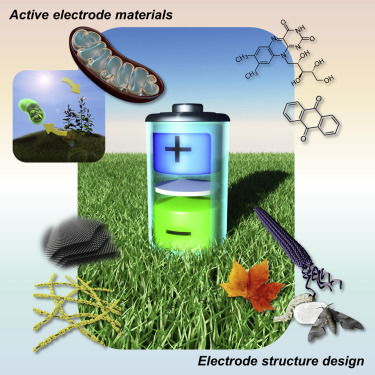Joule ( IF 38.6 ) Pub Date : 2017-11-16 , DOI: 10.1016/j.joule.2017.10.013 Byungju Lee , Youngmin Ko , Giyun Kwon , Sechan Lee , Kyojin Ku , Jihyeon Kim , Kisuk Kang

|
To meet the ever-increasing energy demands and sustainability requirements, next-generation battery systems must provide superior energy densities while employing eco-friendly components. Transition metal oxide-based materials have served as important high-energy-density battery electrodes over the past few decades; however, their further development is challenging as we approach the theoretical limits arising from their crystal structures and constituting elements. Exploiting materials from biological systems, or bio-inspiration, offers an alternative strategy to overcome the conventional energy storage mechanism through the chemical diversity, highly efficient biochemistry, sustainability, and natural abundance provided by these materials. Here, we overview recent progress in biomimetic research focused on novel electrode material design for rechargeable batteries, exploiting redox-active molecules involved in the biometabolism and diverse bioderived materials with various morphologies. Successful demonstrations of energy storage using biomimetic materials that simultaneously exhibit outstanding performance and sustainability would provide insight toward the development of an eco-friendly and high-efficiency energy storage system.
中文翻译:

开发生物系统:朝着环保和高效可充电电池发展
为了满足不断增长的能源需求和可持续性要求,下一代电池系统必须在采用环保组件的同时提供卓越的能源密度。在过去的几十年中,基于过渡金属氧化物的材料已成为重要的高能量密度电池电极。然而,随着我们接近其晶体结构和构成元素所产生的理论极限,它们的进一步发展具有挑战性。利用生物系统中的材料或生物灵感,提供了一种替代策略,可以通过这些材料提供的化学多样性,高效的生物化学,可持续性和自然丰度来克服常规的能量存储机制。这里,我们概述了仿生研究的最新进展,该研究侧重于可充电电池的新型电极材料设计,利用了参与生物代谢的氧化还原活性分子以及具有各种形态的多种生物衍生材料。使用仿生材料同时具有出色的性能和可持续性的储能成功演示,将为开发环保,高效的储能系统提供见识。











































 京公网安备 11010802027423号
京公网安备 11010802027423号